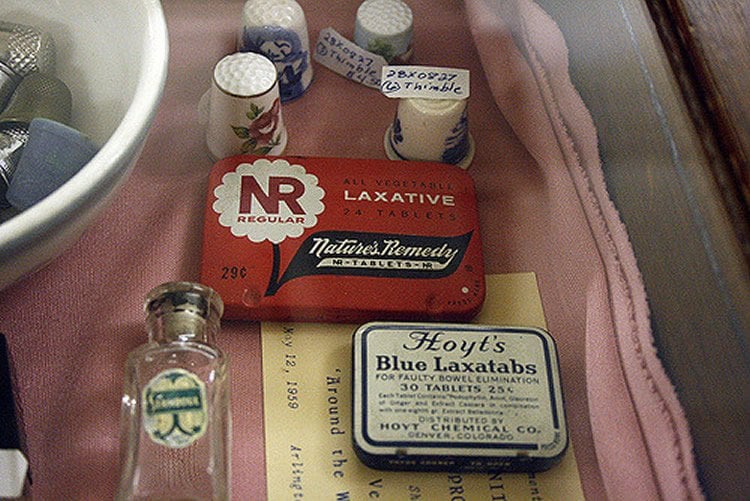Summary: Researchers report the rigidity found in Parkinson’s flattens off with regular use of laxatives to help manage constipation.
Source: Wiley.
In a recent retrospective analysis, investigators discovered that the year-on-year increase in rigidity found in Parkinson’s disease flattened off with the regular use of laxatives to manage constipation.
The findings lend support to the team’s previous research indicating that changes in the gut — and perhaps a disturbed balance in the microbes that reside there — may affect aspects of Parkinson’s disease. The group is working on elucidating the precise mechanisms involved.
“That the apparent effect of regular laxatives appeared in those who had never received drugs for Parkinson’s disease points to modification of an underlying disease process,” said Dr. John Dobbs, co-lead author of the British Journal of Clinical Pharmacology analysis. “Different aspects of Parkinson’s disease may, of course, have different drivers,” added co-lead author Dr. Sylvia Dobbs. “For example, our controlled trial of eradicating Helicobacter from the stomach showed a beneficial effect on the diminished movement characteristic of Parkinson’s disease.”

Funding: This study was supported by Psychiatry Research Trust, London for financial support. It received grants from and the Cyril Corden Trust, and the Cecil Pilkington Charitable Trust, and donations from Brian Newman and Louise Barton, Richard & Diana Gloyn. Barclays Corporate Social Responsibility Ambassador, Nicholas Smith, co-ordinated a fundraising programme for the Psychiatry Research Trust. Open access funding provided by King’s College London.
Source: Penny Smith – Wiley
Image Source: This NeuroscienceNews.com image is credited to jmawork and is licensed CC BY SA 2.0.
Original Research: Full open access research for “Quantifying rigidity of Parkinson’s disease in relation to laxative treatment: a service evaluation” by Aisha D. Augustin, André Charlett, Clive Weller, Sylvia M. Dobbs, David Taylor, Ingvar Bjarnason and R. John Dobbs in British Journal of Clinical Pharmacology. Published online April 8 2016 doi:10.1111/bcp.12967
[cbtabs][cbtab title=”MLA”]Wiley. “Effect of Laxatives Could Provide New Clues About Parkinson’s.” NeuroscienceNews. NeuroscienceNews, 19 May 2016.
<https://neurosciencenews.com/parkinsons-laxatives-neurology-4256/>.[/cbtab][cbtab title=”APA”]Wiley. (2016, May 19). Effect of Laxatives Could Provide New Clues About Parkinson’s. NeuroscienceNews. Retrieved May 19, 2016 from https://neurosciencenews.com/parkinsons-laxatives-neurology-4256/[/cbtab][cbtab title=”Chicago”]Wiley. “Effect of Laxatives Could Provide New Clues About Parkinson’s.” https://neurosciencenews.com/parkinsons-laxatives-neurology-4256/ (accessed May 19, 2016).[/cbtab][/cbtabs]
Abstract
Quantifying rigidity of Parkinson’s disease in relation to laxative treatment: a service evaluation
AIM
To estimate whether laxatives prescribed for constipation in Parkinson’s disease (PD) could moderate rigidity. Constipation pre-dates diagnosis of PD by decades. Deposition of misfolded-protein may begin in gut, driven by dysbiosis. Successive antimicrobial exposures are associated with cumulative increase in rigidity, and rigidity has biological gradients on circulating leucocyte-subset counts.
METHODS
Retrospective service evaluation, in a gut/brain axis clinic, yielded an interrupted-time-series, relating maintenance laxative and other medication to rigidity, in consecutive out-patients identified by inclusion and exclusion criteria. Objective assessment of rigidity was used to bring greater sensitivity to change, validated against subjective gold-standard (UPDRS).
RESULTS
There were 1493 measurements of torque required to extend (flexor-rigidity) and flex (extensor-rigidity) forearm in 79 PD-patients over 374 person-years. Both were strongly associated with UPDRS (P < 0.001 & =0.008, respectively). Before exhibition of laxative, flexor-rigidity increased by 6 (95% CI 1, 10)% per year, plateauing during at -2 (-4, 1)% per year, with no shift at initiation. Change in slope was significant (P = 0.002), and manifest in those naïve to anti-parkinsonian medication. The change was replicated for individual laxative classes (bulk, osmotic, enterokinetic). There was no temporal change in extensor-rigidity. Limited experience with a quanylate cyclase-C receptor agonist (17 patients, 6 person-years) indicated a large and significant step-down in flexor- and extensor-rigidity, of 19 (1, 34) and 16 (6, 24) respectively (P = 0.04 and <0.001).
CONCLUSIONS
Maintenance laxative usage was associated with apparent stemming the temporal increase in rigidity in PD, adding to indicative evidence of a continuing role of gastrointestinal dysbiosis in pathogenesis.
“Quantifying rigidity of Parkinson’s disease in relation to laxative treatment: a service evaluation” by Aisha D. Augustin, André Charlett, Clive Weller, Sylvia M. Dobbs, David Taylor, Ingvar Bjarnason and R. John Dobbs in British Journal of Clinical Pharmacology. Published online April 8 2016 doi:10.1111/bcp.12967







